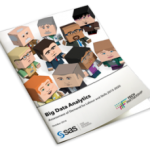The UK government is such a great candidate to benefit from better analysis and use of data both internally and externally, given the volume of data available to it. So it was pleasing to see this article by Eddie Copeland, Head of Technology Policy at Policy Exchange, where he argues that the government needs to “fundamentally redesign how it works” to make better use of technology and data. I wholeheartedly agree that it can’t just be about “bolting new technology on to old ways of working.” We need a bit of a revolution!

Last year, we launched a report with the Tech Partnership that highlights the challenges facing the UK economy when it comes to filling data-driven positions. By 2020 there will be 56,000 jobs across the UK for big data specialists, yet over three-quarters of big data positions are currently described as difficult to fill. Crucially, using data in public services is about achieving efficiencies, and that is key for any future government. But whether there is a Government Chief Data Officer or not, those efficiencies will only eventually be achieved by ensuring the data and analytics skills gap is addressed.
Many assume we can’t address these issues until there are sufficient graduates emerging with the necessary qualifications. The reality is that many of these skills can be acquired by those already in the workforce. For example, SAS University Edition provides free access to SAS Foundation technologies so that anyone, not just those in higher education, can use and learn SAS. There are even free beginner e-learning courses – Programming 1 and Statistics 1 – to help future data experts launch successful careers.
We need people throughout the public sector with the ability to not only use data, but to act as evangelists and educators within the organisation, so government can start to achieve the streamlined processes it needs. As I’ve pointed out already, one of the key challenges is a complete change in outlook – for example, more sharing of data between government departments and an appreciation of the various ways this might be achieved.
If it stands still the UK government will continue to store up problems for itself. As Eddie points out, when it comes to technology-based reform of government, “the electorate deserves to know that there is an alternative.”
